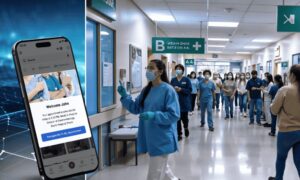The healthcare industry is one of the most vital sectors in any society. It is the backbone of our well-being, providing care and treatment to those in need. Within this vast field, medical and clinical careers offer a wide range of opportunities for individuals passionate about helping others. Whether you’re interested in direct patient care, research, or administration, there’s a role for you.
The Importance of Medical and Clinical Careers
Medical and clinical careers are not just jobs; they are vocations. They play a crucial role in maintaining public health, advancing medical knowledge, and improving the quality of life for countless individuals. The demand for healthcare professionals is ever-growing, driven by an aging population, advances in medical technology, and the need for specialized care. These careers offer not only personal satisfaction but also job security and competitive salaries.
Direct Patient Care Roles
Direct patient care is the most visible aspect of medical and clinical careers. These professionals work on the front lines, interacting directly with patients. They diagnose, treat, and provide ongoing care to individuals across various settings, from hospitals to outpatient clinics.
Physicians and Surgeons
Physicians and surgeons are among the most respected and essential roles in healthcare. They diagnose and treat illnesses, perform surgeries, and guide patients through their recovery. Becoming a physician or surgeon requires extensive education and training. After completing a bachelor’s degree, aspiring doctors must attend medical school, followed by residency and, in many cases, additional specialized training.
The rewards, however, are substantial. Physicians and surgeons have the potential to make a significant impact on their patients’ lives, and they often enjoy lucrative salaries. Moreover, they can specialize in various fields, such as cardiology, orthopedics, or pediatrics, tailoring their careers to their interests.
Nursing
Nursing is another cornerstone of patient care. Nurses are responsible for a wide range of duties, from administering medications to monitoring patient progress and providing emotional support. There are several levels of nursing, including Certified Nursing Assistants (CNAs), Licensed Practical Nurses (LPNs), Registered Nurses (RNs), and Nurse Practitioners (NPs).
Nurses are in high demand, and the field offers excellent job security. Moreover, nursing provides flexibility, with opportunities to work in various environments, such as hospitals, clinics, schools, and even patients’ homes. For those seeking advancement, many programs allow RNs to pursue advanced degrees, leading to roles such as Nurse Practitioners or Clinical Nurse Specialists.
Allied Health Professions
Allied health professions encompass a broad range of roles that support and complement the work of physicians and nurses. These professionals are essential in diagnosing, treating, and rehabilitating patients, often working behind the scenes or in specialized areas of care.
Medical Technologists and Lab Technicians
Medical technologists and lab technicians are critical in diagnosing diseases and conditions. They perform laboratory tests on blood, tissue, and other bodily fluids, helping physicians make accurate diagnoses. These roles require strong analytical skills and attention to detail.
To enter this field, individuals typically need a degree in medical technology or a related field. Certification is often required, depending on the state or country. The demand for skilled lab technicians is growing, especially with advances in medical research and personalized medicine.
Radiologic Technologists
Radiologic technologists, also known as radiographers, are responsible for performing imaging procedures, such as X-rays, MRIs, and CT scans. These images help physicians diagnose and treat various conditions. Radiologic technologists must be skilled in operating complex machinery and ensuring patient safety during procedures.
A degree in radiologic technology is typically required, along with certification. This field offers a dynamic work environment and opportunities for specialization in areas like mammography or radiation therapy.
Research and Development Roles
For those interested in advancing medical knowledge and developing new treatments, research and development (R&D) careers are ideal. These roles are often less visible to the public but are crucial in the fight against diseases and the improvement of healthcare practices.
Medical Researchers
Medical researchers conduct studies to understand diseases, develop new treatments, and improve existing ones. They work in various settings, including universities, hospitals, and pharmaceutical companies. Their work can lead to breakthroughs that save lives and improve health outcomes.
A career in medical research typically requires an advanced degree, such as a Ph.D. or M.D. Researchers must be meticulous, creative, and persistent, as their work often involves long hours and complex problem-solving. However, the rewards can be substantial, both in terms of personal fulfillment and the impact on public health.
Administrative and Support Roles
Medical and clinical careers are not limited to direct patient care or research. There are also numerous administrative and support roles that are essential to the functioning of healthcare institutions. These roles ensure that hospitals, clinics, and other healthcare facilities run smoothly and efficiently.
Healthcare Administrators
Healthcare administrators manage the operations of healthcare facilities. They oversee budgets, staff, and policies, ensuring that the institution provides high-quality care while remaining financially viable. This role requires a strong understanding of both healthcare and business principles.
A degree in healthcare administration or a related field is typically required, along with experience in healthcare settings. Healthcare administrators play a vital role in shaping the future of healthcare, making decisions that impact patient care and organizational success.
Medical Billing and Coding Specialists
Medical billing and coding specialists are responsible for processing insurance claims and ensuring that healthcare providers are reimbursed for their services. They translate medical procedures and diagnoses into standardized codes, which are then used for billing purposes. This role requires attention to detail and knowledge of medical terminology.
Certification in medical billing and coding is often required, and the demand for these specialists is growing as the healthcare system becomes more complex. This career offers stability and the potential for remote work, making it an attractive option for many.
The Future of Medical and Clinical Careers
The future of medical and clinical careers is bright, with continued growth expected across various roles. Advances in technology, such as telemedicine, artificial intelligence, and personalized medicine, are transforming the healthcare landscape. These innovations will create new opportunities and challenges for healthcare professionals.
Moreover, the aging population will drive demand for healthcare services, particularly in fields like geriatrics and chronic disease management. Healthcare professionals who can adapt to these changes and continue learning will be well-positioned for success.
The Role of Education and Training
Education and training are critical in preparing for a medical or clinical career. The healthcare field is constantly evolving, and professionals must stay updated with the latest knowledge and skills. This may involve pursuing advanced degrees, certifications, or continuing education courses.
For those considering a career in healthcare, it’s essential to research the educational requirements for your desired role. Many careers in this field require years of study and training, but the rewards are well worth the investment.
Conclusion
Medical and clinical careers offer a wide range of opportunities for those passionate about healthcare. Whether you’re interested in direct patient care, research, or administration, there’s a role that suits your skills and interests. These careers are not only fulfilling but also provide job security, competitive salaries, and the chance to make a significant impact on society.
As the healthcare industry continues to grow and evolve, the demand for skilled professionals will only increase. By pursuing a medical or clinical career, you can play a vital role in improving public health and shaping the future of healthcare. Whether you’re just starting or looking to advance your career, the possibilities in this field are endless.



































